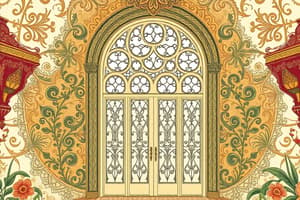Podcast
Questions and Answers
A home buyer, loan originator, mortgage lender, and loan servicer are all part of the residential mortgage process.
A home buyer, loan originator, mortgage lender, and loan servicer are all part of the residential mortgage process.
True (A)
The loan originator, lender, and servicer are always part of the same company.
The loan originator, lender, and servicer are always part of the same company.
False (B)
The mortgage lender always services the loan.
The mortgage lender always services the loan.
False (B)
Retail lenders are a type of loan originator.
Retail lenders are a type of loan originator.
The mortgage industry has not experienced any major crises in its history.
The mortgage industry has not experienced any major crises in its history.
Which of the following best describes the role of a loan originator in the mortgage process?
Which of the following best describes the role of a loan originator in the mortgage process?
What is a key difference between a mortgage lender and a loan servicer?
What is a key difference between a mortgage lender and a loan servicer?
Which entity is responsible for providing the actual financial capital for a mortgage loan?
Which entity is responsible for providing the actual financial capital for a mortgage loan?
What distinguishes a 'retail lender' within the mortgage industry?
What distinguishes a 'retail lender' within the mortgage industry?
What is the primary role of an intermediary who brings together lenders and borrowers for a commission?
What is the primary role of an intermediary who brings together lenders and borrowers for a commission?
A non-profit organization that provides banking services for a labor union is known as a:
A non-profit organization that provides banking services for a labor union is known as a:
Which legislation was enacted in response to the S&L crisis, imposing new rules on savings and loan associations?
Which legislation was enacted in response to the S&L crisis, imposing new rules on savings and loan associations?
What term is used to describe a period when housing prices increase to unsustainable levels?
What term is used to describe a period when housing prices increase to unsustainable levels?
What is a key characteristic of a subprime loan?
What is a key characteristic of a subprime loan?
What term is often used to collectively describe savings and loan institutions?
What term is often used to collectively describe savings and loan institutions?
Which of the following best describes a loan originator's role in the mortgage process?
Which of the following best describes a loan originator's role in the mortgage process?
What happens after a mortgage lender approves and funds a loan?
What happens after a mortgage lender approves and funds a loan?
Which event led to the passage of the Financial Institutions Reform, Recovery, and Enforcement Act (FIRREA)?
Which event led to the passage of the Financial Institutions Reform, Recovery, and Enforcement Act (FIRREA)?
What was the primary goal of the Troubled Asset Relief Program (TARP)?
What was the primary goal of the Troubled Asset Relief Program (TARP)?
In 2008, what action did the government take regarding Fannie Mae and Freddie Mac?
In 2008, what action did the government take regarding Fannie Mae and Freddie Mac?
Flashcards
Mortgage Process
Mortgage Process
The process of getting a mortgage, including pre-approval, application, underwriting, closing, and loan servicing.
Loan Originator
Loan Originator
A person or company that helps borrowers find and get approved for a mortgage loan.
Depository Institutions
Depository Institutions
Lenders that are part of financial institutions like banks and credit unions.
Mortgage Companies
Mortgage Companies
Signup and view all the flashcards
The Great Depression
The Great Depression
Signup and view all the flashcards
Financial Institutions Reform, Recovery and Enforcement Act (FIRREA)
Financial Institutions Reform, Recovery and Enforcement Act (FIRREA)
Signup and view all the flashcards
Troubled Asset Relief Program (TARP)
Troubled Asset Relief Program (TARP)
Signup and view all the flashcards
Federal Housing Administration (FHA)
Federal Housing Administration (FHA)
Signup and view all the flashcards
Federal National Mortgage Association (Fannie Mae)
Federal National Mortgage Association (Fannie Mae)
Signup and view all the flashcards
Conservatorship
Conservatorship
Signup and view all the flashcards
Balloon Payment Mortgage
Balloon Payment Mortgage
Signup and view all the flashcards
Credit Union
Credit Union
Signup and view all the flashcards
Thirty-Year Fixed-Rate Mortgage
Thirty-Year Fixed-Rate Mortgage
Signup and view all the flashcards
Insolvency (in the context of financial institutions)
Insolvency (in the context of financial institutions)
Signup and view all the flashcards
Housing Bubble
Housing Bubble
Signup and view all the flashcards
Subprime Loan
Subprime Loan
Signup and view all the flashcards
Mortgage Lender
Mortgage Lender
Signup and view all the flashcards
Thrifts
Thrifts
Signup and view all the flashcards
Study Notes
Learning Objectives
- Students should be able to explain the basic mortgage process
- Students should be able to distinguish between different types of loan originators and how they help borrowers
- Students should be able to describe government regulations affecting loan originators
- Students should be able to list the different types of mortgage lenders and how their businesses have changed over time
- Students should be able to discuss important historical events in the mortgage industry including the Depression and the Savings and Loan crisis, and how the government responded
- Students should be able to summarize the factors leading up to the mortgage and financial crisis and the impact it may have on the mortgage industry
Suggested Lesson Plan
- Students should be given Exercise 4.1 to review the previous chapter
- The instructor should provide a brief overview of Chapter 4, and review the learning objectives for the chapter
Present Lesson Content
- Description of the Mortgage Industry
- Basic steps in the mortgage process
- Loan origination
- Types of loan originators
- Government regulation
- Mortgage Lenders
- Depository institutions
- Mortgage companies
- Alternative sources of funding
- Government Intervention in Mortgage Lending
- The Depression
- Savings and loan crisis
- The Mortgage and financial crisis
Chapter 4 Outline: The Mortgage Industry
- Basic Steps in Mortgage Process
- The process involves a home buyer, loan originator, mortgage lender, and loan servicer
- The entities may not all be part of the same company
- Often, someone other than the lender services the loan
- Loan Origination
- Retail lenders
- Deal directly with borrowers, who deal with loan officers or loan originators
- Wholesale lenders
- Use intermediaries, such as brokers or correspondents
- Retail lenders
Types of Mortgage Lenders
- Banks
- Savings banks
- Credit unions
- Mortgage companies
Government Intervention in Mortgage Lending
- The Depression
- The government created the Federal Housing Administration to help stabilize the mortgage industry
- The FHA provided insurance that protected lenders against defaulting borrowers and made it easier for them to provide long-term loans
- The Savings and Loan Crisis
- Deregulation of the 1980s allowed S&Ls to make riskier investments
- Many S&Ls failed and needed a large government bailout in the 1980s
- The government created new regulations to help stabilize the industry
The Mortgage and Financial Crisis
- Factors contributing to the crisis
- Growth of the subprime market
- Relaxation of underwriting standards
- Looser rules and lax oversight
- Foreclosure crisis
- Home values declined
- Many homeowners had mortgages greater than the value of their property
Government Response to the Mortgage and Financial Crisis
- Government actions to address the crises
- Housing and Economic Recovery Act
- Takeover of Fannie Mae and Freddie Mac
- Troubled Asset Relief Program
- 2010 Dodd-Frank Act
Studying That Suits You
Use AI to generate personalized quizzes and flashcards to suit your learning preferences.
Related Documents
Description
This quiz covers the basic mortgage process, types of loan originators, and government regulations affecting them. Additionally, it discusses historical events such as the Savings and Loan crisis and the factors leading up to the financial crisis, providing a comprehensive understanding of the mortgage industry.




